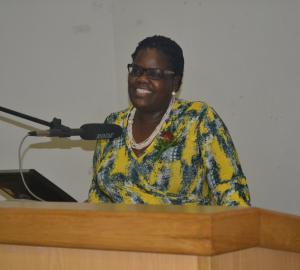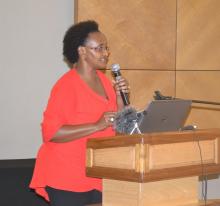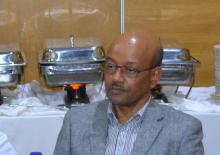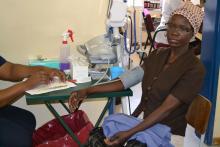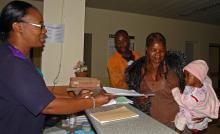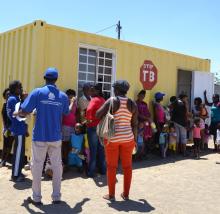Namibia 2014-2015 Health Accounts Report Launched
The Honorable Deputy Minister of Health and Social Services, Ms. Juliet Kavetuna on 05 October 2017 launched the Namibia 2014-2015 Health Accounts Report. This report presents the findings of Namibia’s Health Accounts exercise for the 2014/15 fiscal year, which is Namibia’s fifth round of Health Accounts and is the second round conducted using the System of Health Accounts (SHA) 2011 methodology. The report is the result of well-planned and organized multidisciplinary efforts of the different players including WHO. These stakeholders by coming together and assembling their strengths and comparative advantages executed and delivered the outcome showcased.
The WHO Representative in remarks made on his behalf congratulated the Ministry of Ministry of Health and Social Services, and all the different sectors involved in undertaking this exercise; and said findings contained in the report is indeed crucial for the future of the Namibian Health Care system and particularly so as the country strives towards the achievement of Universal Health Coverage, and the Sustainable Development Goals.
The System of Health Accounts (SHA) tracks all health spending in a given country over a defined period of time regardless of the entity or institution that financed and managed that spending. It generates consistent and comprehensive data on health spending in a country, which in turn can contribute to evidence-based policy-making. SHA 2011 can be used as a monitoring and evaluation tool to track changes in policy priorities and health resources allocation and expenditure following the introduction of reforms and new programs.
The implications and importance of the report for Namibia, is highlighted in the second paragraph in the foreword which states :
“ Health Accounts estimation is a vital component of health systems strengthening in Namibia as it provides sound estimates of spending on health and therefore provides critical information required for evidence-based decision-making. It provides stakeholders with information on the value of purchased health care goods and services and patterns in financing, provision, and consumption of health care resources. This information will direct the Ministry of Health and Social Services and other national policymakers, donors, and stakeholders in their strategic planning and dialogue to inform decision making for health and social service delivery”.
The report highlights some achievements as well as some areas that need improvement. The government contribution to health spending which comprises 13 percent of the government’s total spending, which is close to the Abuja target of 15 percent. This demonstrates clearly the high level of commitment to health shown by the Government of the Republic of Namibia.
Approximately 9% of total health expenditure is household’s out-of-pocket (OOP) expenditure which is relatively low in comparison to other countries in the sub-region. It needs to be monitored and managed progressively since these payments could cause significant financial burden to the household and may have dangerous implications including fall in to poverty. WHO discourages high levels of OOP payments as they are inequitable and consistently prove to be an inefficient means of financing health care.
There are several more issues and recommendations raised in the report which need to be reflected in the policies and plans of government. With close to two-thirds of health spending in Namibia provided by the government, the government has demonstrated a strong commitment to health. However, going forward, it is important for the MOHSS to understand whether its health spending is sufficient and equitable across the population. The government should aim to understand the extent to which there are unmet health needs or where its spending is not reaching those who need it the most – groups who are underutilizing health services because of financial and other barriers to access. By comparing costed projections with Health Accounts data on past spending, the government can predict resource gaps and mobilize resources accordingly.



